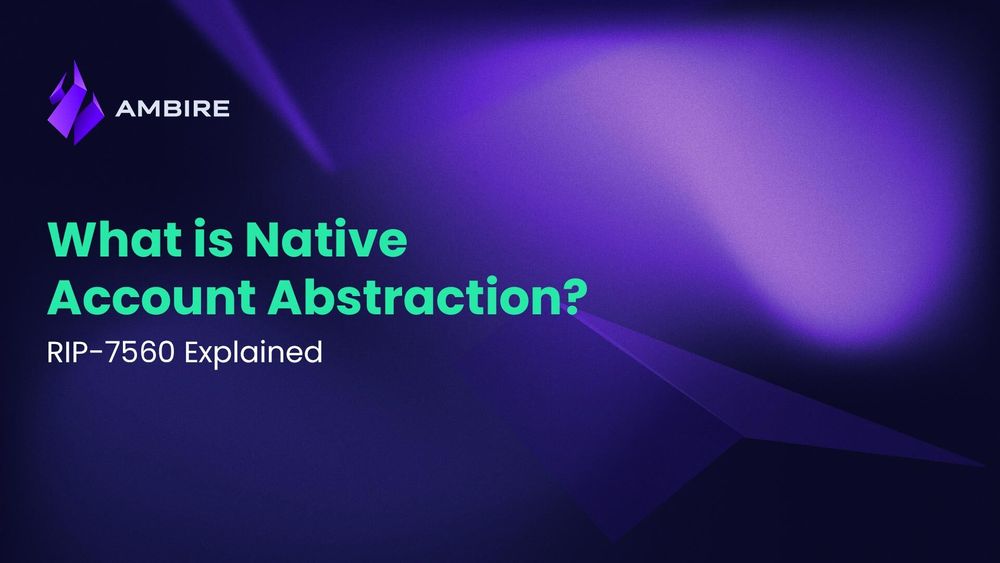What is Native Account Abstraction? RIP-7560 Explained
Learn more about native account abstraction, a concept recently introduced and described in RIP-7560.

In this article, we look into detail Native account abstraction, as published in RIP-7560. Before we dive deeper into Native account abstraction, let’s first look at what EIPs, ERCs, and RIPs are.
What is the difference between ERC, EIP, and RIP?
EIP stands for Ethereum Improvement Proposal and is a standard used in Ethereum to improve how Ethereum-based technologies are developed and integrated. EIPs are used to propose changes to the Ethereum protocol itself.
ERC or Ethereum Request for Comment is another standard - this time, though used to standardize new features and to make them compatible with the Ethereum network rather than changes to the core protocol (like EIPs).
RIP stands for Rollup Improvement Proposal and is the newest standard (talks about them only started in October 2023). The concept of a Rollup Improvement Proposal is akin to Ethereum Improvement Proposals (EIPs) but is specifically targeted at improving or modifying rollup technology. The Native account abstraction RIP you will learn more about is the first RIP to be published.
What is Native Account Abstraction (RIP-7560)?
Native account abstraction, as proposed in RIP-7560, is essentially a native version of ERC-4337 (an enshrinement of 4337). Unlike 4337, it requires protocol changes, so this is more of a long-term proposal.
Native account abstraction allows contracts to authorize transactions and pay gas fees, streamlining interactions and removing the need for intermediary steps. It aims for backward compatibility with the ERC-4337 framework, ensuring a seamless transition for projects already using Account abstraction.
Key features include a new transaction type for more efficient processing and non-sequential nonce support to accommodate complex use cases. The proposal addresses limitations like excess gas costs and limited node participation (decentralized mempool), paving the way for a more efficient and user-friendly Ethereum ecosystem.
The key contributors behind the proposal are Vitalik Buterin, the co-founder of Ethereum, along with other notable Ethereum developers and researchers such as Yoav Weiss, Alex Forshtat, Dror Tirosh, and Shahaf Nacson.
What’s the difference between Native Account Abstraction (RIP-7560) and Account Abstraction (ERC-4337)?
When comparing RIP-7560 to ERC-4337, the key difference is where the abstraction occurs. ERC-4337 implements account abstraction as a layer on top of Ethereum's existing structure, using smart contract wallets to simulate advanced features. In contrast, RIP-7560's native account abstraction integrates these capabilities directly into the Ethereum protocol.
This native integration can lead to a more seamless and efficient operation, potentially improving the overall user experience and security on the Ethereum network.
The background to RIP-7560 can be traced to earlier proposals like EIP-2938 and ERC-4337, which also aimed at account abstraction but approached it differently. While EIP-2938 suggested changing the Ethereum protocol to allow more flexible account behaviors, and ERC-4337 offered a solution at the application level, RIP-7560 aims to embed these capabilities natively within Ethereum's core system. This 'native' integration means that the advanced features of account abstraction, such as enhanced security with customizable rules and a more intuitive user experience, would become inherent to the Ethereum ecosystem.
Benefits of Native Account Abstraction
RIP-7560 can be seen as the natural progression and enshrinement of ERC-4337's account abstraction concepts, integrating them directly into Ethereum's protocol layer. This integration is a significant leap forward from ERC-4337, which implemented account abstraction at the application layer through smart contract wallets.
RIP-7560 improves the Ethereum network by significantly reducing gas costs for account abstraction transactions. This efficiency stems from its design, which incorporates and builds upon the principles of ERC-4337. Moreover, the proposal leverages the tooling and contracts already developed for ERC-4337, facilitating a more seamless integration. A notable feature of RIP-7560 is the introduction of gas abstraction for Externally Owned Accounts (EOAs), ensuring that transactions under this new system are as cost-efficient as traditional ones. This integration improves transaction cost efficiency and streamlines compatibility with existing Ethereum applications and tools.
The decentralized mempool proposed by RIP-7560 benefits the Ethereum network by enhancing transaction efficiency and security. Unlike ERC-4337, which relies on separate participants called bundlers for processing transactions, RIP-7560's approach broadens participation, reducing reliance on a select few and promoting a more resilient and distributed network.
Ambire's stance on Native Account Abstraction
As a pioneer in account abstraction, Ambire Wallet has been at the forefront of this innovative approach, currently handling a transaction volume that surpasses the combined total of all other AA wallets. This significant achievement underscores the wallet's impact and user trust in its capabilities.
Implementing RIP-7560, which advocates for native account abstraction, requires protocol-level changes to the Ethereum blockchain. Such foundational changes, while promising, often necessitate a more extended period for development, testing, and deployment to ensure stability and security. Consequently, realizing native account abstraction, as outlined in RIP-7560, may take some time before it goes live. Luckily, this is a RIP, so we hope it will get implemented quickly in rollups and prove itself.
The team behind Ambire Wallet is extremely excited about the potential of Native account abstraction. We recognize the transformative possibilities this change could bring to the Ethereum network and its users. Integrating such advanced features at the protocol level aligns well with Ambire Wallet's innovative ethos and could open new horizons for functionality, security, and better user experience.
Related articles
Account Abstraction and the Benefits of Smart Contract Wallets
Account Abstraction Use Cases: Simplifying the Decentralized Web
Interested in Ambire? Follow us:
Discord | X (Twitter) | Reddit | GitHub | Telegram | Facebook
